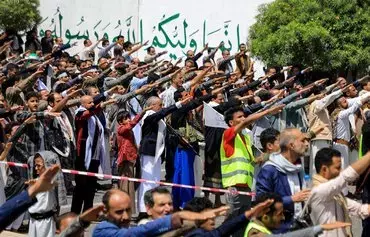Politics
Houthi factions fight over money as Yemenis grapple with hunger
Conflict between wings of the Houthi group breaks out into the open, amid a race to outdo each other in corruption and looting of funds.

By Faisal Abu Bakr |
ADEN -- Conflict has erupted between two factions of the Iran-backed Houthis, researchers in Yemen say, with the two sides trading accusations of corruption.
News of conflict between the two factions over money has leaked as the Yemeni public grapples with hunger and poverty.
The infighting is between senior Houthi leaders who are attempting to seize and amass wealth and boost their influence within the group under the pretext of supporting the war effort in Yemen, say observers.
One faction is led by Ahmed Hamed, director of the office of the head of the group's Supreme Political Council, Mahdi al-Mashat, Al-Sharq al-Awsaat reported on July 29.
![Children walk to class at a makeshift school at a camp for those displaced by conflict in Yemen's northern Hajjah province on August 7. News of conflict between the two factions of the Houthis over money has leaked as the Yemeni public grapples with hunger and poverty. [Essa Ahmed/AFP]](/gc3/images/2023/08/14/43536-Yemen-camp-conflict-370_237.webp)
The other is headed by Mohammed Ali al-Houthi, a member of the group's Governing Council and a cousin of the group's leader, the report said.
The escalating dispute between Hamed and al-Houthi reached a boiling point after al-Houthi publicly accused Hamed of perpetrating corruption, sponsoring corrupt individuals and appropriating public funds and allocations for the fighting fronts.
The confrontation centers on an incident in which Houthi officials seized the equivalent of $200 million, sources told the media outlet.
There has been extensive reporting about the Houthis' infighting over the years.
Sources said the branch of the Oversight and Accountability Agency run by the Houthi leader Mohammed al-Imad, who is affiliated with the al-Houthi faction, has reported on a facet of the corruption of Hamed's wing.
One of the agency's periodic review reports stated that Houthi Land Transport Authority head Walid al-Wadei had seized close to $200 million in funds.
That report and the media campaign that accompanied it prompted al-Mashat to dismiss al-Wadei from his position, which he had held for eight years.
Various media outlets reported the exchange of accusations between the two sides, with Hamed in turn accused of looting more than $14 billion from the state.
Hamed also is accused of plundering funds estimated at about $13 billion under various pretexts, including the "war effort", supporting the fronts and caring for the families of martyrs.
Absolute power and excessive looting
"The reasons for the conflict between the Houthi factions are clear," said political analyst Fares al-Beel.
"We are looking at a group that came out of nowhere and suddenly took control of a large part of the country and all its resources and found all the wealth there for the taking without any deterrence, responsibility or oversight," he said.
The Houthis hold "absolute power, and consequently there is excessive looting", he explained.
After the group's coup, he said, its leaders "found themselves sitting on great wealth, money and all the tools of enrichment".
"These disputes came out into the open despite the strict discipline imposed on the group by Iranian experts from the Islamic Revolutionary Guard Corps (IRGC) and Hizbullah," al-Beel said.
The Houthis do not have a financial system or oversight to ensure transparency, he said, but "the secrecy with which the group surrounds its activities is what covers up many cases of corruption by the leaders".
"The opportunity for self-enrichment is there," he added, noting that he expects this to lead to an explosive situation in the future.
"The Houthis have built a financial and economic system that runs parallel to state institutions in order to destroy those state institutions, plunder them and seize their assets," said economist Abdul Aziz Thabet.
The race between the group's leaders to amass wealth and influence intensified the rivalry between the factions, each of which pursues its own interests by destroying state institutions, he said.
Looting aid
Conflict erupted some time ago between the Hamed and al-Houthi factions, said Sanaa municipality Human Rights Office director general Fahmy al-Zubairi.
The Hamed faction plunders the funds of international organizations and aid, to the tune of billions of dollars, he said, while al-Houthi's faction seeks to grow his wealth and influence.
Al-Houthi "sees himself as entitled to hold al-Mashat's position" as head of the group's Supreme Political Council, he said.
In its attempt to supplant al-Mashat and take his share of the plundered funds, al-Houthi and his faction "are spreading rumors of corruption to weaken the other wing", al-Zubairi added.
He noted that corruption is rampant amid the suspension of public sector salaries and restrictions imposed by the Houthis on workers in their shops, trade and companies.
"This corruption manifests through the major urban expansion taking place in Houthi-controlled areas," he said, noting the competition between the Houthi factions to steal funds comes at a time when "people are dying of hunger".
According to Yemeni Deputy Minister of Information Osama al-Sharmi, the Houthis are "investing in war and mobilizing people for war".
There are no longer any opponents to the Houthis in the areas under their control, he pointed out, which means the public leaking of such incriminating reports is coming from within the group itself.
The conflict between the group's leaders "is out in the open, as one side steals international aid while the other steals state funds from within and neither wants its corruption exposed to the world", he said.
It is ironic that the Houthis once presented themselves as a force to eradicate corruption, he said, noting that they now "engage in corruption and looting of money amid rising poverty, hunger, and cutoff of salaries in the country".
Only citizens suffer
agree